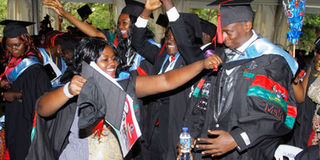Are you making the most out of your careers department?

Most career department heads when approached say students are dodgy when it comes to career guidance-related events but experts say career guidance is one way of equipping students for the field. FILE PHOTO
What you need to know:
Many at a time, employers complain about graduates they feel are not prepared enough for their careers yet universities have career guidance departments. Are they being underutilised?
At least every university in Uganda has a Career Development Department responsible for organising career development events for students preparing them for the future.
Though these departments are in place, employers are increasingly losing confidence in hiring fresh graduates. Among the complaints is that most of these university students are not competent enough though they have the degrees.
“Some do not know anything about time management, others do not know work ethics and some act like they are not sure whether they are in the right professions,” observes Lucy Asiimwe, a human resource manager at Ministry of Public Service.
But are career departments at universities functional? Or is it that students are not fully utilising them? What are these departments doing to make students better their career decisions?
Ronald Awany of Career Department and Placement at Uganda Christian University (UCU), Mukono elaborates that some students do not embrace career development trainings. He says at UCU, the career department was forced to carry out a survey which helped them identify reasons why students were shunning career guidance events.
“Among the services we provide our students with is a career clinic that we organise for first year and continuing students every semester. In this clinic, we teach students about soft skills such as professional communication, self-management, dress code and how one is supposed to conducts themselves in a workplace. We also have a finalists’ career week where we train students that are almost completing their course on how to package themselves for a competitive job market,” he explains.
Ongoing process
To Henry Nsuubuga, the head of Career guidance and counselling at Makerere University, career guidance is an ongoing process that university students should embrace. At Makerere, he explains that this department helps students to choose what to study especially those who are not sure of what they want and also helps students that need to change courses. He adds that they organise career guidance events where they bring several employers on board to speak to students directly.
However, he says the department is sometimes constrained due to lack of enough personnel.
“It is necessary for students to learn how to package their CVs, conduct themselves during interviews and other basic soft skills that they may not be able to get while in class,” he says.
Nsubuuga advises students to stop dodging career trainings organised at universities.
Jean Nuwagaba, the head of counselling and career guidance at Kyambogo University, says they give career guidance in a multilateral approach. She adds that the office of guidance and counselling focuses on the learner’s ability to discover and enhance their intellectual potential.
“This is done through helping individual learners to prioritise and set realist life and academic goals and develop strategies to achieve them,” she elaborates.
What are the basics?
Awany says by the time a student graduates, they should be in position to write a winning CV as well as knowing how to effectively write a good cover letter. He adds that students should also be able to know how to conduct themselves while at workplaces and basic as well as being conversant with basic working ethics.
“Do not only go to the university only to acquire a degree. Have it at the back of your mind that you need to leave the university as a complete package,” he says adding that this can only be attained by taking career guidance and counselling services that the university provides seriously.


